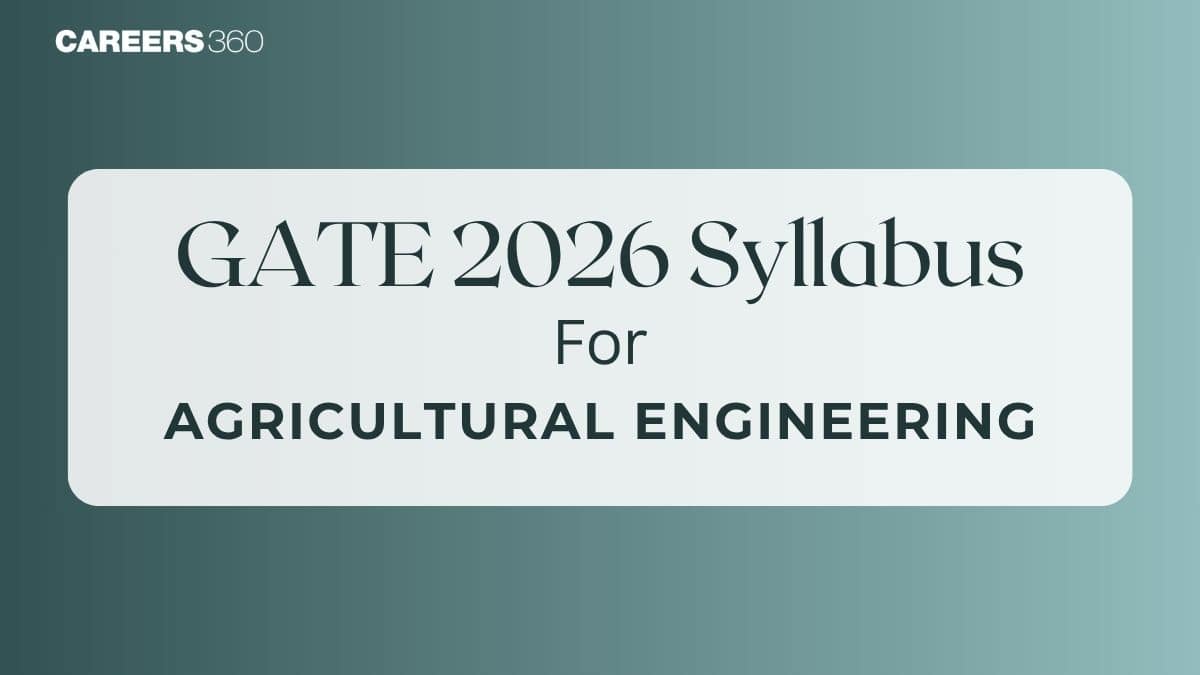UPES M.Tech Admissions 2026
Last Date to Apply: 25th Feb | Ranked #45 Among Universities in India by NIRF | 1950+ Students Placed 91% Placement, 800+ Recruiters
GATE 2026 Syllabus for Agricultural Engineering (AG)- IIT Guwahati has released the GATE 2026 syllabus for Agricultural Engineering on the official website, gate2026.iitg.ac.in. The GATE 2026 AG syllabus provides a detailed list of all the topics based on which the Graduate Aptitude Test in Engineering will be conducted. Some major topics are Farm Machinery, Farm Power, Soil and Water Conservation Engineering, Irrigation and Drainage Engineering, etc. Candidates preparing for the upcoming exam must refer to the Agricultural Engineering syllabus of the Graduate Aptitude Test in Engineering for effective preparation. The authorities will conduct the GATE 2026 exam on February 7, 8, 14, and 15, 2026. The GATE exam date for the AG paper is February 7, 2026.
Download GATE 2026 AG syllabus PDF
In case of any query or discrepancy in the GATE answer key, candidates can contact the authorities through the helpline numbers at 022-2576 7068 and 022-2572 4054.

Preparing as per the GATE Agricultural Engineering Syllabus 2026 will help candidates with their exam preparation. This page has been updated with the official GATE 2026 syllabus for agricultural engineering PDF on this page.
The GATE 2026 syllabus for Agricultural Engineering is a good study resource as it helps students familiarise themselves with what topics to expect in the exam. The GATE Syllabus for Agricultural Engineering Science mentions the topic from the concerned subject as well as from the Mathematics and General Aptitude part. Read the complete article for the GATE 2026 agricultural engineering syllabus PDF.
With the help of the GATE 2026 Agricultural Engineering syllabus PDF, candidates can check the list of topics to prepare for the exam. Below is the list of topics covered in the GATE 2026 Agricultural Engineering syllabus.
Frequently Asked Questions (FAQs)
IIT Guwahati will conduct the GATE 2026 exam.
The GATE Agricultural engineering syllabus 2026 has been released on August 8, 2025.
Candidates can refer to Concept of Agricultural Engineering by Mohanty Das, Farm Machinery and Soil & Water Conservation by VVN Murthy for the GATE AE 2026 exam.
On Question asked by student community
Hello,
The link to the question paper is attached here. You can also find the answer key that will help you analyse your in-depth performance. Careers360 provides students with preparation tips that will help them utilise their time effectively in preparartion.
https://engineering.careers360.com/articles/gate-metallurgical-question-papers
Thank you
Hello,
Yes, you can get admission in M.Tech CSE without GATE .
Through university entrance exams
Many universities conduct their own M.Tech entrance exams. You have to qualify the test and sometimes attend an interview.
Through JET for M.Tech
JET (JAIN Entrance Test) is conducted by Jain University.
It is
Hii
No you cannot get admission to IIT for M Tech if your B Tech is not completed at the time of admission, even if you clear the GATE cutoff but Yes, you can appear for GATE 2028 in your 3rd year of B Tech even if your degree is
Hello,
The link to the question paper is attached here. You can access the question papers along with the answer key on the careers360 website. Careers360 also provides students with preparation tips that will help them in preparing and the mock test and analyse their in-depth performance.
https://engineering.careers360.com/articles/last-15-years-gate-papers-solutions
Thank you.
Hello,
Here is a link for the sample papers for GATE Exam with DA subjects. Tap on the link given below to open it:
Thankyou.
Among top 100 Universities Globally in the Times Higher Education (THE) Interdisciplinary Science Rankings 2026
NAAC A+ Accredited | Among top 2% Universities Globally (QS World University Rankings 2026)
Last Date to Apply: 25th Feb | Ranked #45 Among Universities in India by NIRF | 1950+ Students Placed 91% Placement, 800+ Recruiters
1st in NPTEL program of 6 IITs | Highest CTC 72 LPA | Scholarships to meritorious students
Asia’s only university to be awarded the highest accreditation by WASC, USA and by the Quality Assurance Agency for Higher Education (QAA), UK
Online PG programs from Symbiosis Centre for Distance Learning